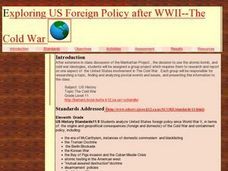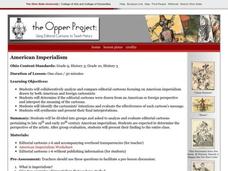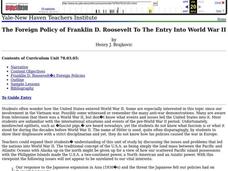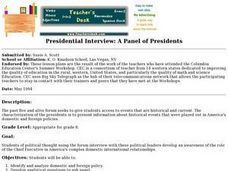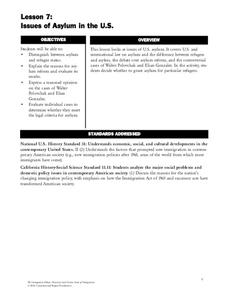Constitutional Rights Foundation
Refugees from the Caribbean: Cuban and Haitian “Boat People”
Should refugees fleeing poverty be allowed the same entrance into the United States as those fleeing persecution? High schoolers read about US foreign policy in the late 20th century regarding refugees from Cuba and Haiti, and engage in...
iCivics
Foreign Policy: War
What is the difference between foreign and domestic policy? What are the primary differences in what the United States hopes to accomplish through foreign aid, the military, and the creation of treaties? Your class members will examine...
Curated OER
Cold War Conflict in Vietnam: The Vietnam-Era Presidency
Comparing and evaluating various media types is a great way to build critical analysis skills. Learners read about the Vietnam era presidency, specifically the foreign policy established by Johnson and Nixon. Then they compare several...
Curated OER
Exploring US Foreign Policy after WWII--The Cold War
Scholars explore U.S. Foreign Policy and Cold War ideologies adopted after WWII. They conduct Internet research on a topic or issue related to the Cold War Era, watch two films, and compose a time line and a multimedia presentation to...
Curated OER
Changing Circumstances, Changing U.S. Foreign Policy
Learners examine how relationships between countries change overtime. They identify the factors that play a role in altering the relationships and contribute to U.S. foreign policy toward their country of research. Groups conduct their...
Center for Civic Education
Ronald Reagan and Executive Power
Article II of the United States Constitution grants Presidents executive powers in areas of international conflict, domestic and foreign policy. Using examples drawn from Ronald Reagan's presidency, class members are asked to consider...
Curated OER
American Imperialism
Critical analysis skills can be built in a variety of ways. Using editorial cartoons (both domestic and foreign) learners will consider how American Imperialism was perceived during the late 19th century. Critical thinking questions,...
Constitutional Rights Foundation
Special Order 40
The city of Los Angeles' 1979 Special Order 40 states: "LAPD officers shall not initiate police action with the objective of discovering the alien status of a person." After reading a fact sheet that details the history of Special Order...
DocsTeach
Documenting Key Presidential Decisions
It's match time! Academics participate in an exciting matching game using primary sources. The activity uses documents of key decisions and matches them to the presidents that they are attributed to. Scholars also make a list of key...
Curated OER
The Foreign Policy of Franklin D. Roosevelt To The Entry Into World War Ii
Students examine the U.S.A.'s entry into World War II, and Franklin DO. Roosevelt's foreign policy. They analyze the life of I.E.., the election of 1932, and the New Deal.
Curated OER
Liberia and the U.S.: Historic Ties and Policy Decisions
Students discuss and analyze factors affecting U.S. foreign policy toward Liberia. They role-play various groups during 1900 who were concerned with the relationship between United States and Liberia as a "colony"
Curated OER
The foreign and domestic policies of Lyndon B. Johnson
Eleventh graders study and evaluate the successes and failures of LBJ's domestic and foreign policies. They formulate historical questions and defend findings based on inquiry and interpretation. Each student identifies, analyzes and...
Curated OER
Presidential Interview: a Panel of Presidents
Eighth graders identify and analyze domestic and foreign policy. They develop analytical questions to ask a panel. They develop a sequence of events of each presidential office holder.
National Endowment for the Humanities
Lesson 1: The United States Confronts Great Britain, 1793–1796
After the Revolutionary War, the success of the United States was far from guaranteed. Foreign powers coveted the new land, and Great Britain challenged American sovereignty. Learners consider the challenges facing the new nation using...
Curated OER
The Cold War Warrior Defending: The Moral Beacon of the World
Students identify President Reagan's domestic and foreign policy, describe America's attitude toward communism, list characteristics which endeared Reagan to the American people, and explain why some Americans spoke out against Reagan's...
Curated OER
Managing or Meddling?
Young scholars examine Bosnian and Herzegovinian society before and during American involvement, focusing on the successes in Brcko. They write a reflective essay considering the role of "helper countries" in foreign affairs.
US House of Representatives
Hispanic Americans in Congress During the Age of U.S. Colonialism and Global Expansion, 1898–1945
To be Puerto Rican, in the words of one politician, is to be "foreign in a domestic sense." Young historians consider the American role in colonialism and its impacts on Hispanic Americans through the first part of the twentieth century...
Curated OER
Defending the Homeland--The Alien and Sedition Acts of 1789
Students explore that there have been times during the history of the US when ,in response to real and perceived threats, both domestic and foreign, our country has responded by passing legislation. Students trace the fundamental rights...
Curated OER
Troop Surge vs. Redeployment
Students explore American foreign policy regarding the war in Iraq. In this Iraq debate lesson, students examine videos and documents about the pros and cons of keeping American troops in Iraq.
Curated OER
Investment
Explore the effects of foreign investment on the world economy. Learners read the noted articles about foreign direct investment and foreign portfolio investment. Then participate in classroom simulation that requires them to determine...
Curated OER
The Philippines-U.S. Involvement
Students research and discuss the rational for U.S. involvement in the Philippines. They discuss overall foreign and domestic policies of the U.S. Then they create a timeline that highlights this impact.
Constitutional Rights Foundation
Issues of Asylum in the U.S.
Who gets to come to the United States? Examine cases of individuals seeking asylum with an informative reading passage that includes examples, statistics, and representations of public opinion regarding asylum. Groups then go on to...
College Board
2011 AP® Macroeconomics Free-Response Questions Form B
Exchange rates are dependent on a variety of factors. Scholars tease out these factors using a prompt from College Board. Another query examines the economic health of a country with barometers such as gross domestic product and wages. A...
Curated OER
Cold War
Eleventh graders analyze U.S. foreign policy since World War II, tracing origins and geopolitical consequences (foreign and domestic) of the Cold War and containment policy.





